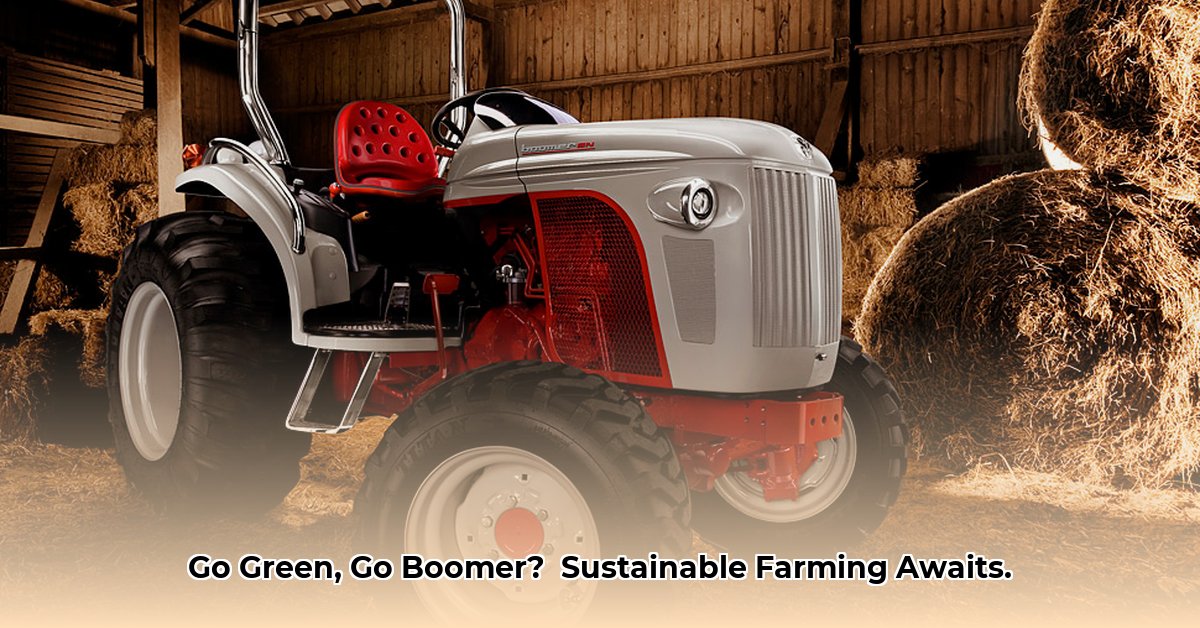
Boomer Tractor: Your Sustainable Farming Partner
Choosing the right compact tractor can be daunting. This review focuses on the New Holland Boomer series, examining its suitability for sustainable agriculture. We'll compare it to competitors like Kubota, analyze its features, and provide actionable advice for potential buyers. This isn't just a review; it's your guide to making an informed decision for environmentally conscious farming. For more on operating costs, see our guide on tractor fuel costs.
Key Features: Designed for Efficiency and Ease
The Boomer series prioritizes efficiency and ease of use, crucial for sustainable farming. Let's examine its key components:
Engine
Boomer tractors typically employ diesel engines, renowned for fuel efficiency. This translates to lower running costs and a reduced carbon footprint compared to gasoline alternatives. Horsepower varies by model – consider your land size and tasks when choosing. Lower horsepower is ideal for smaller operations and maximizes fuel efficiency.
Transmission
Many Boomer models feature hydrostatic transmissions, providing smooth, precise speed control. This is invaluable for delicate tasks like planting and mowing, minimizing soil compaction and crop damage. This precision greatly benefits sustainable agriculture practices.
Hydraulics
The hydraulic system powers various attachments. Lifting capacity varies by model; ensure it's sufficient for your implements (tillers, balers, loaders, etc.). Adequate hydraulic power is vital for efficient and sustainable farming operations.
Attachments
The Boomer's versatility stems from its wide array of compatible attachments. From tillers to mowers and loaders, the range of tools greatly expands its functionality. Consider which attachments are essential for your specific sustainable farming techniques.
Performance in the Field: Real-World Capabilities
User feedback suggests Boomer tractors are surprisingly capable for their size. Many praise their maneuverability, ideal for smaller farms or plots with obstacles. Ease of operation is a significant advantage for both seasoned and novice farmers. However, their relatively lower horsepower compared to larger tractors should be factored into the decision process. If your operations demand significant power, a Boomer might not be the ideal choice.
Isn't fuel efficiency a crucial aspect of sustainable farming? Real-world fuel consumption reports consistently highlight the Boomer's cost advantages. But, remember to match the tractor's power to the size and demands of your farm.
Comparing the Competition: Making an Informed Choice
Kubota and John Deere are key competitors in the compact tractor market. While Boomers often have a competitive price point, remember to consider factors like attachment availability and after-sales service. Before purchasing, meticulously compare models from all manufacturers.
Sustainability Assessment: Minimizing Environmental Impact
Sustainable farming is paramount. Boomer tractors contribute through their diesel engines' better fuel efficiency compared to gasoline alternatives, resulting in lower emissions. The tractors' compact size further reduces fuel consumption. However, the total environmental impact also depends on implement choices and farming practices.
Cost Analysis: A Long-Term Perspective
Consider the total cost of ownership. This includes the initial purchase price, fuel consumption, maintenance intervals (including parts availability), and potential resale value. A thorough cost-benefit analysis is essential before any investment.
Choosing Your Boomer: A Practical Guide
Buying a tractor is a considerable investment. Follow these steps:
- Assess your needs: What tasks will the tractor perform? This determines the required horsepower and attachments.
- Measure your land: Land size affects maneuverability and power requirements.
- Set your budget: Account for purchase price, maintenance, and potential repairs.
- Choose your attachments: Consider current and future needs.
- Test drive: If possible, test different models for a hands-on experience.
Boomer Tractor: A Summary of Pros and Cons
| Pros | Cons |
|---|---|
| Competitive pricing | Limited horsepower compared to larger tractors |
| User-friendly operation and maintenance | Fewer attachment options than some competitors |
| Excellent maneuverability | Resale value might be lower than some brands |
| Fuel-efficient diesel engine | May not be suitable for all heavy-duty tasks |
Final Thoughts: The Right Tractor for You
The best tractor depends on your specific requirements. The Boomer offers affordability, ease of use, and fuel efficiency, but its power limitations make it unsuitable for all farming operations. Carefully weigh all factors, research thoroughly, and test-drive if possible. The optimal choice perfectly aligns with your needs and sustainable farming goals.